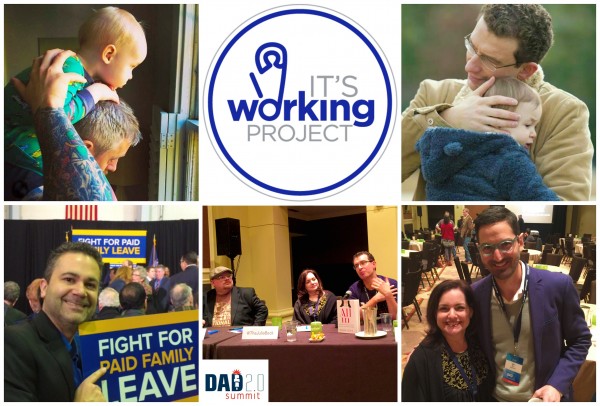
The Parenting Penalty (formerly known as the Motherhood Penalty, perhaps progress!?) is no longer just a workplace buzzword. Now both moms and dads are facing serious challenges at home when work culture does not align with familial expectations. Simply put, when work doesn’t cooperate, things can go bad fast.
We at It’s Working Project are hearing from parents that their workplace cultures are affecting their primary relationships at home. This was part of our discussion this past weekend at the Dad 2.0 Summit where I was part of a panel and shared new survey data from the It’s Working Project.
This impressive panel, “The State of Shared Parenting: So Much Done, So Much More To Do” was lead by a journalist and author I have long respected, Brigid Schulte. Schulte, the author of Overwhelmed: Work, Love and Play and Why No One Has the Time, has long talked about the need for work-life balance, and how workplaces and policies can shape what our work, home lives and successes look like. Schulte knows from her own experience: juggling two kids and a demanding job at The Washington Post. She shared her now-famous Thanksgiving anecdote of coming home ready to cook a big meal with her husband, only to watch him reach for a beer and announce he was going to a friend’s house. Even for those of us who live and breathe the work-life balance discussions, we still have moments that ask: How did we get here?
These unique personal experiences and professional priorities are what drives all of us, in different ways. Fellow panelist, journalist and radio host, NPR’s Guy Raz, spoke about his role in joint parenting. Josh Levs spoke about his book All In, and what it means to speak up for paid parental leave. Blogger Chris Roulty spoke about the changing language, and how “Stay At Home Dad” encompasses much more than just fathers who wait in line for preschool pickup.
I was there to talk about our experience at the It’s Working Project, and how we’ve learned through the rich, personal narratives of the Portrait Project that the policies at the office can affect and change the primary relationships at home. We’re not just talking career trajectory and the parenthood penalty. What’s happening at work is directly affecting a relationship trajectory, and not for the better.
At the conference, I shared some newly released data that the It’s Working Project has produced. In a survey of parents this month, nearly all our respondents (86 percent) reported that their own work culture affected their primary relationship, and over half of those respondents (44 percent) said their primary relationships were affected “a great deal.” Similar numbers held when we reversed the question and asked about how a spouse’s work culture affected their primary relationship; nearly all (89 percent) agreed that it did, and nearly a third (28 percent) said their primary relationships were affected a great deal.
Much of the conversation has focused on the parenthood penalties that men and women face in their careers, but our study is one of the first looks of how workplace flexibility and culture are affecting lives at home starting with their primary partnership.
So what does this mean? This means we need to start viewing workplace culture through the lens of the whole of parents’ lives — attempting to align the policy and culture to reflect the way we live. More couples are splitting their responsibilities 50/50, but we don’t yet have a workplace culture that recognizes or supports that division of labor. The economy is also driving these conversations, as more employers will look up and see the crisis in their pipeline. Employers are realizing they will not be able to staff their organization unless they provide the family-friendly policies millennials are demanding.
The It’s Working Project continues to make back-to-work conversations a priority, and we know our work is far from done. But conversations like these are a powerful — and effective — place to start.
